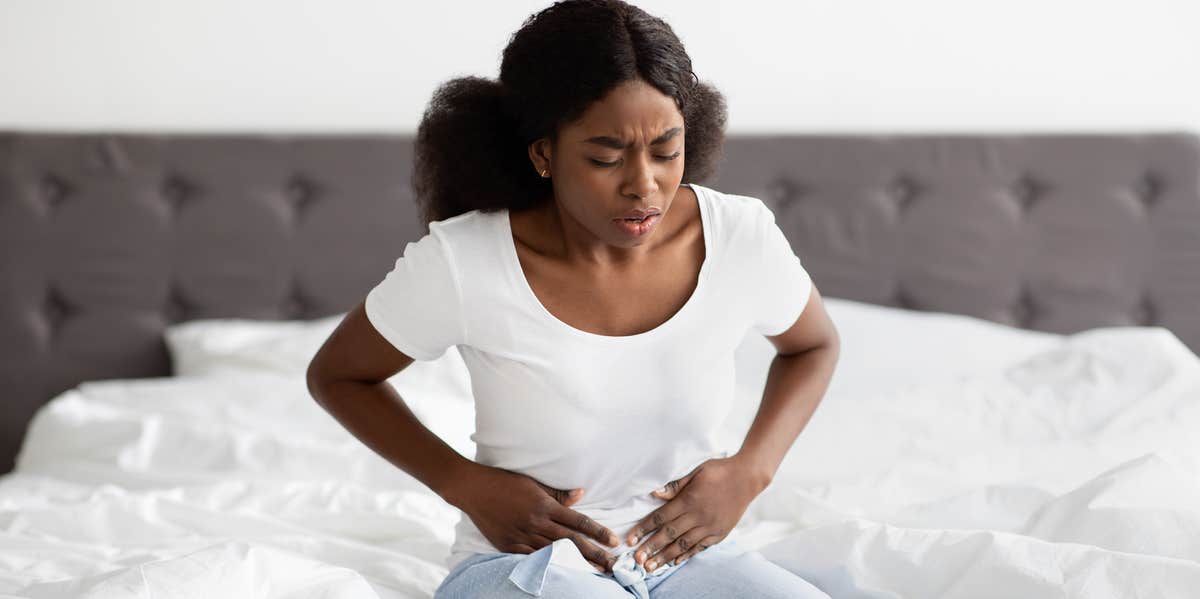The One Disease Every Girl Seriously Needs To Be Aware Of
Here is what you need to know about it.
 Prostock-studio / shutterstock
Prostock-studio / shutterstock Endometriosis is a painful, chronic disease that affects at least 6.3 million women and girls in the U.S., 1 million in Canada, and millions more worldwide. So why do so many women not know about it?
I am a 21-year-old woman and I first learned about endometriosis a few months back.
For 21 years I have lived a life unaware of this illness. I have gone through a great education, several sex ed classes, and visits to my doctor and nurse, and yet I have never heard about this illness until a friend of mine revealed why she did not want to go out and drink one weekend.
The realization of that shocked and scared me. And what was even worse, was that I am not the only one unaware.
Here is what you need to know about endometriosis:
1. It is a chronic disease.
Endometriosis is a condition where tissue similar to the lining of the uterus is found elsewhere in the body. Cells from the lining of the womb are found in other areas of your body, usually your ovaries, bladder, or bowel.
The cells are stimulated by estrogen, so they bleed during your period. However, because they have no way out of your body, the trapped blood causes inflammation and severe pain.
2. It is more common than you might think.
Endometriosis affects an estimated 1 in 10 women during their reproductive years. An estimated 176 million women worldwide are affected, regardless of their ethnic and social background.
It might not be much of a comfort, but if you are suffering from the condition it is important to remember that you are not alone.
It is more common than you might think, and, for example, actress and "Girls" creator, Lena Dunham, is an open sufferer of endometriosis.
3. The symptoms can be brutal.
The most common symptom of endometriosis is pelvic pain. The pain often occurs alongside menstruation, during ovulation, and/or in connection with sexual intercourse. For many women, the pain of endometriosis is so severe and debilitating that it impacts their lives in significant ways.
Other symptoms can include infertility, abdominal bloating, heavy or irregular bleeding, and severe fatigue.
4. Diagnosis is tricky.
Many remain undiagnosed and are therefore not treated. Lack of awareness results in endometriosis taking an average of nine years to diagnose. The problem is that a lot of symptoms of endometriosis can be really similar to other conditions, like irritable bowel syndrome, or an ovarian cyst.
Although an ultrasound may be recommended, endometriosis can only be confidently diagnosed through laparoscopy, which is a keyhole surgery that you’ll need a general anesthetic for.
5. The cause of endometriosis isn’t yet known.
There are different hypotheses as to what causes endometriosis. Unfortunately, none of these theories have ever been entirely proven, nor do they fully explain all the mechanisms associated with the development of the disease.
6. And there’s still no ‘cure’.
There is no known cure for endometriosis, but there are treatments that can help ease symptoms. Managing pain varies from woman to woman, ranging from simple options like breathing techniques and heat pads to painkillers, hormonal medication, or surgery.
7. It doesn’t automatically mean you’re infertile.
It is estimated that 30-40% of women with endometriosis may have difficulties in becoming pregnant. This, however, means that 60-70% will have no problems. It’s dependent on many different factors, including the severity of your endometriosis and your age.
Even though the disease might still seem vague and hard to diagnose, it is really important to know about it. As a woman in your reproductive years (from the onset of menstruation to menopause), it is very likely that either you or someone in your group of friends/ family are sufferers of endometriosis.
If you are experiencing heavy pain or any other symptoms that are affecting your daily life, you should talk to your doctor and gynecologist about the possibility of endometriosis. And if you have it, remember that you are not alone.
Unwritten is a website for millennials written and run by millennials. We’re committed to giving Generation-Y the discussion they need, whether it be a source of news, a much needed laugh, a comforting shoulder to cry on, or a place to have their own stories heard.

